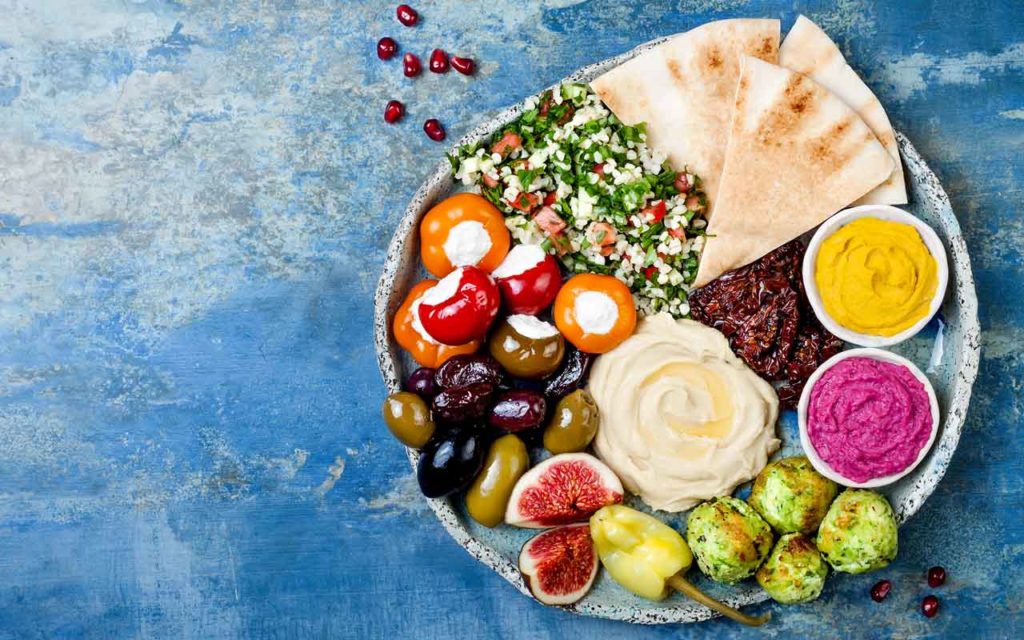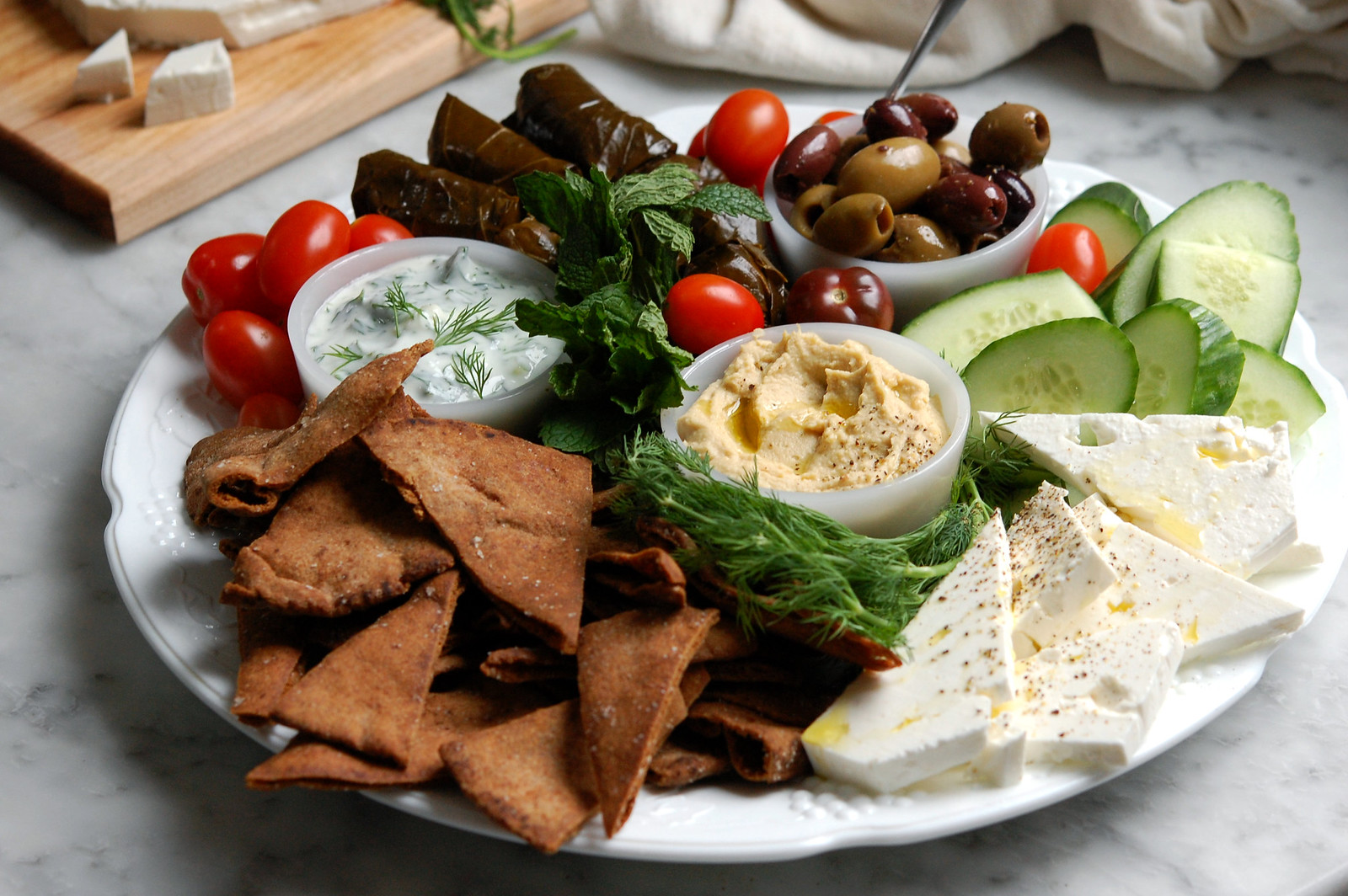Exploring the culinary crossroads of the Mediterranean, we embark on a adventure to discover the intricate tapestry of flavors and traditions that outline Greek delicacies. Is Greek meals Mediterranean? The solution lies in a harmonious mix of shared heritage, distinctive traits, and a colourful culinary historical past.
Delving into the guts of Greek gastronomy, we find a symphony of flavors that tantalizes the palate. From the fragrant embody of olive oil to the colourful dance of unpolluted herbs and succulent seafood, Greek delicacies stands as a testomony to the bountiful Mediterranean panorama.
Defining Mediterranean Delicacies: Is Greek Meals Mediterranean
Mediterranean delicacies is a culinary taste that encompasses the meals and flavors of the nations bordering the Mediterranean Sea. It’s characterised by way of its use of unpolluted, seasonal components, herbs, and spices, in addition to its emphasis on wholesome consuming and conviviality.
The Mediterranean vitamin has been known by way of UNESCO as an Intangible Cultural Heritage of Humanity. It’s in accordance with the standard nutritional patterns of the folks dwelling within the Mediterranean area, and has been proven to have a large number of well being advantages, together with a discounted chance of middle illness, stroke, kind 2 diabetes, and a few forms of most cancers.
Geographical and Cultural Traits
The Mediterranean area is a various one, each geographically and culturally. It contains nations from Europe, Africa, and Asia, and every nation has its personal distinctive culinary traditions. Then again, there also are many commonalities between the cuisines of those nations, because of the shared local weather and historical past of the area.
The Mediterranean local weather is characterised by way of sizzling, dry summers and gentle, rainy winters. This local weather is perfect for rising all kinds of culmination, greens, and herbs. The Mediterranean Sea additionally supplies an abundance of seafood, which is a staple of the area’s delicacies.
The historical past of the Mediterranean area may be a various one. The area has been house to many various civilizations over the centuries, and every civilization has left its mark at the area’s delicacies. As an example, the Greeks presented the usage of olive oil, the Romans presented the usage of pasta, and the Arabs presented the usage of spices.
Not unusual Substances and Dishes, Is greek meals mediterranean
Probably the most maximum commonplace components utilized in Mediterranean delicacies come with:
- Olive oil
- Garlic
- Herbs (reminiscent of basil, oregano, and thyme)
- Spices (reminiscent of cumin, coriander, and paprika)
- Greens (reminiscent of tomatoes, onions, and peppers)
- Culmination (reminiscent of grapes, figs, and melons)
- Seafood
- Legumes
- Entire grains
Probably the most maximum commonplace dishes in Mediterranean delicacies come with:
- Salads
- Soups
- Stews
- Pasta dishes
- Rice dishes
- Grilled meats
- Seafood dishes
- Cakes
Traits of Greek Meals

Greek delicacies is famend for its unique flavors, recent components, and conventional cooking ways. Olive oil, herbs, and recent produce shape the cornerstone of Greek dishes, making a harmonious mix of Mediterranean flavors.
Greek meals is characterised by way of its simplicity and reliance on recent, seasonal components. Olive oil is used widely, each as a cooking medium and as a condiment. Herbs reminiscent of oregano, thyme, rosemary, and basil upload fragrant intensity to dishes, whilst recent greens like tomatoes, cucumbers, onions, and peppers supply colourful colours and textures.
Regional Permutations
Greek delicacies shows regional permutations, reflecting the rustic’s numerous geography and cultural influences. Dishes from the northern areas, reminiscent of Macedonia and Thrace, ceaselessly incorporate influences from neighboring Balkan nations, whilst dishes from the southern areas, like Crete and the Peloponnese, show off a more potent Mediterranean aptitude.
- Northern Greece:Identified for its hearty dishes like moussaka, pastitsio, and spanakopita.
- Central Greece:Options dishes like souvlaki, gyros, and saganaki.
- Southern Greece:Showcases dishes like recent seafood, grilled meats, and horiatiki salad.
- Islands:Be offering distinctive dishes like fava beans, octopus stew, and saganaki with shrimp.
In spite of those regional permutations, Greek delicacies maintains a cohesive id, characterised by way of its use of unpolluted components, flavorful herbs, and the distinct style of olive oil.
Similarities and Variations between Greek and Mediterranean Delicacies
Greek and Mediterranean delicacies percentage a wealthy culinary heritage rooted within the sun-drenched lands surrounding the Mediterranean Sea. They’re sure by way of a shared historical past, cultural influences, and a love for recent, seasonal components.
Shared Substances and Cooking Strategies
- Olive Oil:The cornerstone of each cuisines, olive oil is used liberally for cooking, dressing, and marinating.
- Greens:Contemporary greens like tomatoes, cucumbers, onions, and peppers are staples in each Greek and Mediterranean dishes.
- Herbs:Herbs reminiscent of oregano, thyme, basil, and rosemary upload colourful flavors to dishes.
- Seafood:The Mediterranean Sea supplies an abundance of unpolluted seafood, which options prominently in each cuisines.
- Grilling:Grilling is a well-liked cooking approach, particularly for meats and greens.
Unique Options of Greek Meals
- Use of Lemon:Greek delicacies is understood for its liberal use of lemon juice, which provides a refreshing tang to dishes.
- Feta Cheese:This crumbly, white cheese is a signature element in lots of Greek dishes, reminiscent of salads, pastries, and dips.
- Moussaka:A layered casserole made with eggplant, potatoes, and flooring meat, crowned with a creamy béchamel sauce.
- Souvlaki:Grilled skewers of marinated meat, ceaselessly served with pita bread and tzatziki sauce.
- Emphasis on Simplicity:Greek dishes ceaselessly show off the herbal flavors of unpolluted components, with much less emphasis on elaborate sauces or advanced ways.
Comparative Desk
| Function | Greek Delicacies | Mediterranean Delicacies ||—|—|—|| Olive Oil | Liberal use | Liberal use || Greens | Contemporary and considerable | Contemporary and considerable || Herbs | Oregano, thyme, basil, rosemary | Identical herb profile || Seafood | Outstanding | Outstanding || Grilling | Not unusual cooking approach | Not unusual cooking approach || Lemon | Unique use | Used, however much less outstanding || Feta Cheese | Signature element | Now not as commonplace || Moussaka | Iconic dish | Now not a commonplace dish || Souvlaki | In style boulevard meals | Much less prevalent || Simplicity | Emphasis on herbal flavors | Frequently extra advanced flavors |
Cultural and Historic Context

The improvement of each Greek and Mediterranean delicacies has been considerably influenced by way of a wealthy tapestry of historic and cultural elements. Business, migration, and cultural trade have performed pivotal roles in shaping those culinary traditions, leading to a colourful and various gastronomic panorama.
The Mediterranean area, a crossroads of civilizations, has witnessed the trade of products, concepts, and culinary practices for hundreds of years. From the Phoenicians and Greeks to the Romans and Arabs, every civilization has left its mark at the area’s delicacies. The spice industry, in particular right through the Center Ages, introduced unique flavors from the East, additional enriching the Mediterranean palate.
Business and Migration
Business and migration were instrumental within the dissemination of culinary concepts and components during the Mediterranean. Greek traders, recognized for his or her seafaring prowess, performed a vital function in spreading Greek culinary traditions to far-flung corners of the Mediterranean. In flip, Greek delicacies used to be influenced by way of the cuisines of the areas they visited, reminiscent of Egypt, Italy, and North Africa.
As an example, the usage of cumin, a spice local to the Center East, changed into commonplace in Greek delicacies after the conquests of Alexander the Nice. In a similar fashion, the advent of tomatoes from the Americas right through the sixteenth century had a profound affect on each Greek and Mediterranean delicacies, changing into a staple element in dishes reminiscent of moussaka and gazpacho.
Cultural Change
Cultural trade, in particular thru non secular practices and fairs, has additionally contributed to the similarities and variations between Greek and Mediterranean delicacies. The Orthodox Christian custom, shared by way of many Mediterranean nations, has influenced fasting practices and the usage of positive components right through non secular vacations.
As an example, right through Lent, Orthodox Christians abstain from meat and dairy, resulting in the advent of meatless dishes reminiscent of fasolada (bean soup) in Greece and lentil soup in Turkey.
Additionally, fairs and celebrations have equipped alternatives for culinary experimentation and the sharing of meals traditions. The Mediterranean vitamin, characterised by way of its emphasis on recent produce, olive oil, and seafood, is a testomony to the area’s shared culinary heritage.
Well being and Dietary Sides

Greek and Mediterranean delicacies is famend for its well being advantages, contributing to longevity and well-being. Adhering to those culinary traditions comes to eating nutrient-rich meals that strengthen general well being.
Wholesome Fat
Greek and Mediterranean delicacies emphasizes the usage of wholesome fat, essentially olive oil. Olive oil is wealthy in monounsaturated fat, which were connected to diminished chance of heart problems, irritation, and sure forms of most cancers. Moreover, it incorporates antioxidants that give protection to towards cell injury.
Entire Grains
Entire grains, reminiscent of brown rice, quinoa, and whole-wheat bread, are staples in Greek and Mediterranean diets. They supply fiber, crucial for keeping up a wholesome digestive device, regulating blood sugar ranges, and selling satiety.
Contemporary Produce
Culmination, greens, and legumes are considerable in Greek and Mediterranean delicacies. Those nutrient-dense meals supply nutrients, minerals, antioxidants, and fiber, which strengthen general well being, cut back irritation, and give protection to towards continual sicknesses.
Doable Well being Implications
Research have persistently proven that adopting a Greek or Mediterranean vitamin may have important well being implications:
- Diminished chance of heart problems, stroke, and sort 2 diabetes
- Progressed cognitive serve as and diminished chance of dementia
- Weight control and diminished chance of weight problems
- Decreased irritation and progressed immune serve as
Total, Greek and Mediterranean delicacies provides a holistic technique to vitamin, selling well being and well-being in the course of the intake of nutrient-rich, minimally processed meals.
FAQ Phase
Is Greek meals regarded as wholesome?
Sure, Greek meals is normally regarded as wholesome because of its emphasis on recent produce, total grains, and wholesome fat like olive oil.
What are some fashionable Greek dishes?
In style Greek dishes come with moussaka, pastitsio, souvlaki, gyros, and spanakopita.
What’s the distinction between Greek and Mediterranean delicacies?
Whilst Greek meals stocks many similarities with different Mediterranean cuisines, it has its personal distinct flavors and cooking ways, such because the intensive use of olive oil, herbs, and recent seafood.
